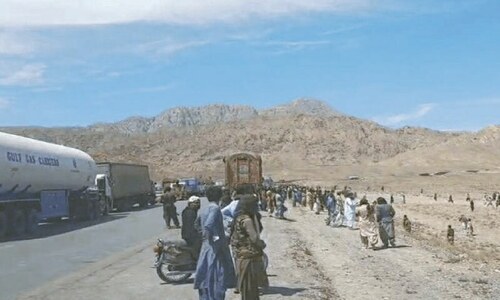TWELVE days into massive protests against his 30-year-old regime, Hosni Mubarak is still hanging on. But so are the protesters. Cross the last security cordon between the Qasr al-Nil Bridge and Tahrir Square and the atmosphere is electric.
Protesters line the street, forming a guard of honour for the new arrivals, greeting them with chants and rhythmic clapping.An onlooker helpfully tries to translate the Arabic: “They are saying, 'Welcome to the garden, where some of our friends are buried. We won't let their sacrifice go in vain'.”
The crowds in Tahrir Square itself are thinner than usual, stricter security checks meaning a queue hundreds of metres long is snaking its way towards the giant lion sculptures at the base of the Qasr al-Nil Bridge.
The bridge is the only access point that is still open to protesters, with the army having sealed off the rest.
Inside the square, thousands have gathered. A giant banner hangs in the centre, inscribed with the English-language translation of the slogan that has come to define the movement. “People demand removal of the regime,” the banner reads.
The place has a carnival-like feel to it. A make-shift stage is in one corner, with artists belting out songs and sloganeers whipping up the crowd.
Small groups of protesters are noisily marching around the square waving Egyptian flags. A journalist from London who has been in the area for a week explains that when each new batch of protesters arrives they march around the square for a bit, simultaneously energising the crowds already present and drawing fresh energy from their response.
But feel-good and friendly as the atmosphere may be, there are also unmistakable signs the business of revolution in authoritarian Arab states is risky stuff.
Rocks litter the side streets, leftover evidence of bloody clashes a few days earlier. The burned-out hulks of cars and police vans sit uneasily next to the tanks that have sealed off the square. And an open clinic manned by volunteer medics tends to the dressings of the wounded.
While outside Tahrir Square there is uncertainty about how this will all end, there is nothing but certainty inside: Hosni Mubarak must go and the people must have a say in the affairs of the state.
A schoolteacher identifying himself as Ikram explains why he is there on a cold, damp Saturday evening: “I couldn't come before because I have two small daughters and my wife wasn't happy. But I had to. For 30 years, this man (Mubarak) didn't let us think for ourselves.”
Seeing the hundreds of people camped out in tents on the grassy bits of a square in the heart of downtown Cairo is certainly surreal. This is not a regime which tolerates much by way of protest, people are at pains to point out.
What appears to have made it possible for the protests to extend into a 12th day on Saturday is a combination of genuine broad-based support and smart organising.
Queuing up for over an hour alongside protesters to gain access to Tahrir Square helps provide a small window into the popular uprising that has riveted the world for two weeks.
Young and old; men, women and children; bearded and clean-shaven; some praying, many laughing and joking; a few burqas, many more T-shirts — the rainbow coalition in Tahrir Square can surely make a solid case that it represents the 'people of Egypt'.
Of course, with much of the country shut down for two weeks, there are dissenters, too. The London-based journalist says that in the wealthier parts of Cairo he has met people complaining about the impact the protests are having on Egypt's economy.But the protesters seem aware of the need to hold the moral higher ground.
The thousands-strong queue outside Tahrir Square is remarkably courteous and restrained. Way is made for those carrying blankets and bags of clothes and food. Whenever a crush develops near the entry point, the crowd quickly falls back at the first cries of discomfort.
The separate queue for women, which merges with the men's at the entrance to Tahrir Square, looks neither harassed nor harried. Perhaps most tellingly, the small group of pro-Mubarak supporters counter-protesting nearby is left unmolested.
Dozens of volunteers are on crowd-control and security duty and take pains to be polite and friendly.
“Welcome to Egypt,” each says after seeing the foreign identification proffered.
And at least for today, it does feel welcome to be in Egypt.














































